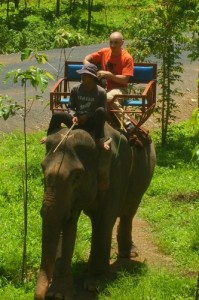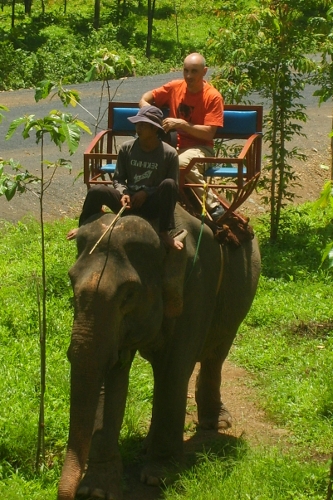Speaking softly, she asked me, “Where you from?”
“Úc”, I answered back.
“Oh-stral-e-ya?” she said, to which I nodded and said, “Australia.”
She smiled and clapped her hands with excitement.
“I am in 11th grade in school, learn English seven year now,” she said. We went through a simple question and answer exercise, covering topics of interest, favorite colors, and if I liked Vietnam. For the more complex words, she wrote down a sentence in her notepad in Vietnamese and handed it to Huang, who then translated everything into English.
After a short conversation, she opened her book to a different page and showed me some sketches of farm animals, the countryside, portraits of her family, and a drawing of a house on stilts. As I looked through the drawings and said how beautiful the drawings were, she saw my digital camera that I had been holding. I took it out and showed how to operate it. She was intrigued by simple functions such as watching the lens zoom in and out and held it carefully, before I taught her how to flick through pictures of different places I had been in Vietnam; cities, towns, and villages she may never get to see. In my mind, her black and white sketches of the same images that I needed a camera to capture would have been amazing. After taking some photos out of the scenery outside as our bus slowly drove past farms, she told Huang that it was her first time at using a camera, but could not make sense of all the buttons and noises. “It is easy for me to draw,” she said to me with a smile.
Before getting off the bus, she pointed to a picture of a girl in full tribal clothing. “That is me,” she said. “I am E De person.” It was a very beautiful sketch, complete with a full length dress. The E De ethnic people are a group who lived in the outlying hills of Yok Don National Park. They live predominately in southern Vietnam.
As the bus slowed down, she got up. “Now I am near home. Tomorrow I help plant rice with my family. Thank you for talking,” she said.
“Thank you, too,” I said, smiling back.
She stood in the aisle, waved to me and said, “Goodbye, Australian friend,” before stepping outside. Then the door slowly closed, the engine roared into gear, and the bus took off.
About fifteen minutes later, it was time for Huang and myself to get off. We walked for an hour in the humid conditions, with Huang noticing that I was perspiring a lot. He told me that the previous wet season did not start on time and that 2008 could be a repeat. “The forest around us is dying, because there is no rain,” he told me. There were tree stumps but few animals. The healthiest part of the forest, Huang said, lay deeper in the jungle heading towards the Cambodian border. “Years ago, wild elephants used to roam here. But the forest is disappearing, so there are none left. You will be riding older, tamed elephants.” When I asked him about the younger elephants, he tried to shy away from the subject, but then he said that ethnic minorities, such as the E De and Jarai, killed elephants for their ivory tusks and made traditional jewelry and medicine.
“That is against the law here in Vietnam,” he said.
We then walked in silence for a while. Maybe he had a bit more to say about the topic but did not know the right words to express his views. Maybe he did not want to sound offensive to a foreigner in case he developed a bad reputation. In his trade, no tourists means no income.
Finally we reached the elephant reserve, and both Huang and I got what we wanted – some shade and iced tea, which I purchased for him. Huang said that he would negotiate with a Mnong native to select an elephant for me. The Mnong people are divided into three categories based on their geographical location in Vietnam; Central, Eastern and Southern. An elderly man appeared from a hut to pick an elephant from the herds of six. Each was bound by a rope and tied to a tree. Five out of the six elephants had their tusks removed, which was described to me as part of the domestication process as a safety measure. One elephant, however, had only half a tusk and roared persistently. I wondered if he was passing on a signal to be put out of his misery.

I was astounded. “Elvis?” I repeated in disbelief.
“Yes, Elvis,” Huang repeated. He then gave me a brief biography of the elephant. A rich American who regularly visited Vietnam named the elephant after the world’s most famous vocalist. He was a fan of Elvis Presley, and the name stuck. While this may not sound glamorous, it would have been more of an insult to a revered creature to be named after Justin Bieber.
The M’nong guide was already seated on the elephant’s neck. He crouched down, whispered a few words into Elvis’s ear. I hoped it was something to do with handling me with care. Then he looked at me and said a few words loudly. Huang relayed the message; “he wants you to get on elephant.” How was I supposed to climb up? I had no ladder. Before I could think of an alternative, two men rushed over and worked in tandem to give me a boost. One of them squatted and the other patted his shoulder while pointing at my foot. “Come, jump,” he said. I placed one foot, then the other, on my makeshift ladder. What happened afterwards was nothing short of a calamity. I wobbled while two guys attempted to push me up high enough so that I could get on board Elvis. I probably outweighed both of my helpers. The whole production resembled a circus act; I am surprised that nobody got hurt. As I slid onto Elvis’s back of the great beast, the ride was finally ready to commence.
“WHACK!” Down came the guide’s bamboo stick on the elephant, who responded slowly. He stopped and started, not appearing keen to being taken out for a test ride in the heat. My guide used his feet to direct the elephant and tapped plants and trees as he told Elvis to stay on the walking track. Every few meters, Elvis would stop to eat leaves as a means of keeping up his energy, something my guide did not like. I did not mind how much Elvis ate; he was carrying two individuals weighing a total of about 140kg. This is slightly less than what Elvis Presley weighed when he died in 1977. One thing that both the king of rock and roll and the elephant had in common was calorie consumption. It is said that an adult Asian elephant consumes around 96,000 calories per day, reportedly the same amount that Elvis Presley consumed daily in the last 18 months of his life.
I marveled at Elvis’s agility to weave between low-hanging branches and trek through mud. For me, this was definitely something special. Like every animal in captivity, he longed to be with his own kind and other endangered species in a promised land of dense forest, far from this tourist zoo. The last time I got anywhere this close to an elephant was in 1999 while touring the Kruger National Park in South Africa, along with 11 other backpackers and a veteran of the Zimbabwean Civil War in an all-terrain vehicle. This time, I was riding bareback, where one false move could have resulted in a fall from seemingly dizzying heights.
When the time came to return to the original departure spot, I patted Elvis on the back, thanking him for returning me safely. This time, I was able to use a makeshift platform to hop off the elephant so that I would not break anybody’s bones in using a human stepladder. Before my time with Elvis was over, I wanted to get a look at his face and stroke his trunk. Working up the courage, I approached from the side and attempted to reach my hand over to pat him. But I was unsuccessful; Elvis pulled away – he was not keen on getting too friendly with me. In my desperation, I sang the opening lines to “Love Me Tender” in a low voice, enough to ensure that it did not attract too much attention. But anything invoking Elvis by name is never going to be a low-key affair. Huang, the Mnong guide and anybody else in the vicinity looked on bemusement, for they must have thought I was crazy for singing a love song to an elephant. By my reckoning, “Hound Dog”, accompanied by some dodgy hip-wiggling, may have caused a catastrophe.
It has been nearly three years since my ride with Elvis. He may have never caught a rabbit, but he is definitely a friend of mine.
Long live The King of Yok Don National Park.







